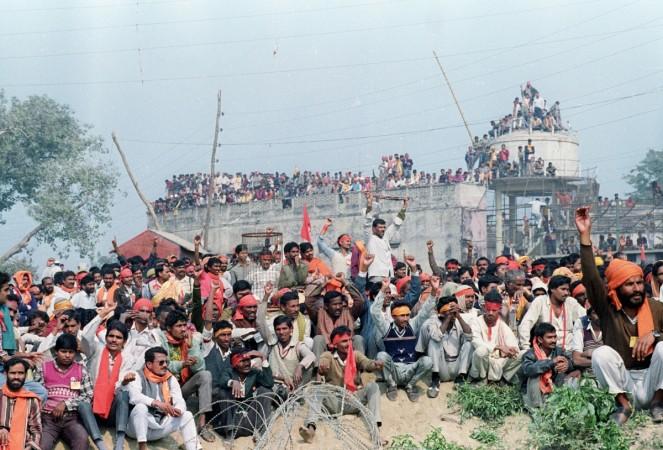
On resumption of court hearing in the long-pending Babri Masjid-Ram Temple dispute in the Supreme Court, the Uttar Pradesh government accused the Muslim parties in the dispute of trying to prolong and avoid adjudication by bringing up issues which have already been settled by the apex court.
The statement was made by Additional Solicitor General Tushar Mehta while addressing a bench of Chief Justice of India Dipak Misra and Justices S Abdul Nazeer and Ashok Bhushan on Friday, July 6.
The Muslim parties are demanding that a 1994 ruling of the Supreme Court − which said that a mosque is not integral to the practice of Islam and namaz (prayer) by Muslims can be offered anywhere, even in the open – be referred to a Constitution Bench.
Mehta told the bench that the Muslim parties never demanded the reopening of the M Ismail Faruqui vs Union of India case ever since the verdict was delivered, adding that the motive to bring it up now was only to delay and avoid adjudication of the long-pending dispute.
When all translations are made and evidence is compiled in several volumes and all appeals become ripe for hearing... suddenly belated efforts started being made visibly and demonstratively to delay the judicial adjudication," Mehta told the court.
M Ismail Faruqui had challenged the validity of Acquisition Of Certain Area At Ayodhya Act, 1993, under which 67.7 acres of land in the disputed complex was acquired by the Central government a month after the disputed Babri Masjid was demolished on December 6, 1992.
![Hindu militants storm a disputed mosque-temple site December 6, 1992 climbing atop the building's dome as they demolish it to clear the site for a Hindu temple. [Representational Image] Babri masjid](https://data1.ibtimes.co.in/en/full/639664/babri-masjid.jpg?h=450&l=28&t=32)
A five-judge bench, headed by the then Chief Justice of India MN Venkatachaliah, delivered its verdict in October 1994 and held that "under the Mahomedan Law applicable in India, title to a mosque can be lost by adverse possession… If that is the position in law, there can be no reason to hold that a mosque has a unique or special status, higher than that of the places of worship of other religions in secular India to make it immune from acquisition by exercise of the sovereign or prerogative power of the State. A mosque is not an essential part of the practice of the religion of Islam and namaz (prayer) by Muslims can be offered anywhere, even in open. Accordingly, its acquisition is not prohibited by the provisions in the Constitution of India."
The UP government also rejected the contention that the Allahabad High Court ruling in 2010 that ordered the disputed Babri Masjid-Ram Janambhoomi site in Ayodhya be divided into three parts was influenced by the judgment in the Faruqui vs Union of India case.
The case so far
The Ayodhya dispute goes back centuries to 1527 when it is claimed that a temple, built on site where Lord Ram is believed to be born, was demolished on orders of Mughal emperor Babur and a mosque was built in its place.
In 1859, the British administration put a fence around the disputed site and earmarked separate areas for Hindus and Muslims to carry out their religious rituals.
However, in 1949, idols of Hindu deities were placed inside the mosque and this led to a dispute between Hindus and Muslims in the region, resulting in civil suits filed by both sides. The government locked the site and declared the area disputed.

In 1950, Gopal Singh Visharad filed a title suit with the Allahabad High Court seeking an injunction to offer puja at the disputed site.
Nirmohi Akhara, a Hindu religious institution, also filed a title suit in 1959, seeking a court order to hand over the site to it, claiming to be its custodian. Meanwhile, the Muslim Central Board of Wakf also knocked on the court's door seeking possession of the disputed site.
The matter reached the Allahabad High Court where a bench started hearing the case in 2002 and by 2010 it completed the hearing.
On September 24, 2010, a three-judge bench of the Allahabad High Court, ruled that the disputed site be divided into three parts – the site for installation of infant Ram idol would go to the Hindu Maha Sabha; Sita Rasoi and Ram Chabutara will go to Nirmohi Akhara and the rest will go to Sunni Wakf Board.
All three parties appealed against the division of the disputed site in the Supreme Court.
On May 9, 2011, the Supreme Court stayed the High Court order and ordered that status quo be maintained. The next hearing of the case is on July 13.

















